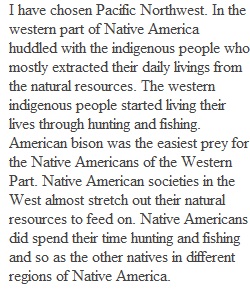


Q This discussion will address the following outcomes: • Describe the cultural, social, and geographic diversity of the Americas before European contact (CO#3, CO#6/Gen. Ed. Outcome 4.2) Native American communities were highly variable depending on region, environmental resources, and cultural development. Variety and adaptation, not uniformity and immutability, more accurately describes the Americas before the Europeans. Pre-contact societies represented the diversity that climate, geography, and other historical factors helped create. Before beginning this discussion, make sure to read Chapter 1: “The New World (Links to an external site.)” and Chapter 2: "Colliding Cultures (Links to an external site.)" in The American Yawp, and the following primary sources: The Journal of Christopher Columbus ,John Lawson Encounters North American Indians, 1709, and "A Gaspesian Indian Defends His Way of Life, 1641" Then view the following short video clips about indigenous societies in the New World: The Aztecs: Aztec Society (Links to an external site.), The Maya (Links to an external site.), Native American Mythology (Links to an external site.), Differences Among Tribes (Links to an external site.), Displacement & Othering (Links to an external site.). Using the primary and secondary sources above as evidence, consider the following in a post of at least 250 words: • Choose one region of the Americas to focus on in your post (i.e. the Pacific Northwest, the Southwest, the Northeast, the Caribbean, Central America, South America) and discuss the kinds of resources that existed for Native American societies there pre-European contact. • How did the Native American societies in the region you chose compare to Native American societies in other regions? • How did these resources influence the societies that arose, and particularly the ones that the Europeans encountered after 1492? How did European contact changes these societies? Then, over the course of the week, respond to the posts of at least two of your classmates. Your initial post must substantively integrate evidence from the assigned readings, including at least two full citations in proper APA (Links to an external site.) or Chicago (Links to an external site.) style. Your initial post is due by Thursday at 11:59PM. Your responses are due by Sunday at 11:59PM. Consult the Discussion Posting Guide for information about writing your discussion posts. It is recommended that you write your post in a document first. Check your work and correct any spelling or grammatical errors. When you are ready to make your initial post, click on "Reply." Then copy/paste the text into the message field, and click "Post Reply." This is a “post first” discussion forum. You must submit your initial post before you can view other students’ posts. To respond to a peer, click “Reply” beneath her or his post and continue as with an initial post. Evaluation This discussion will be graded using a rubric. Please review this rubric prior to beginning your work. View the rubric by clicking on the gear icon at the top right side of this page or on the Course Rubrics page within the Start Here module. All discussions combined are worth 20% of your final course grade
View Related Questions